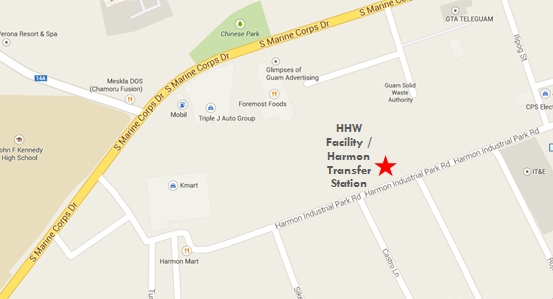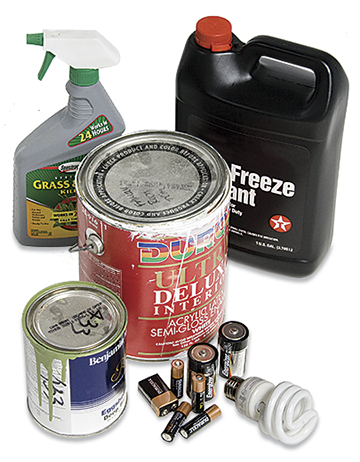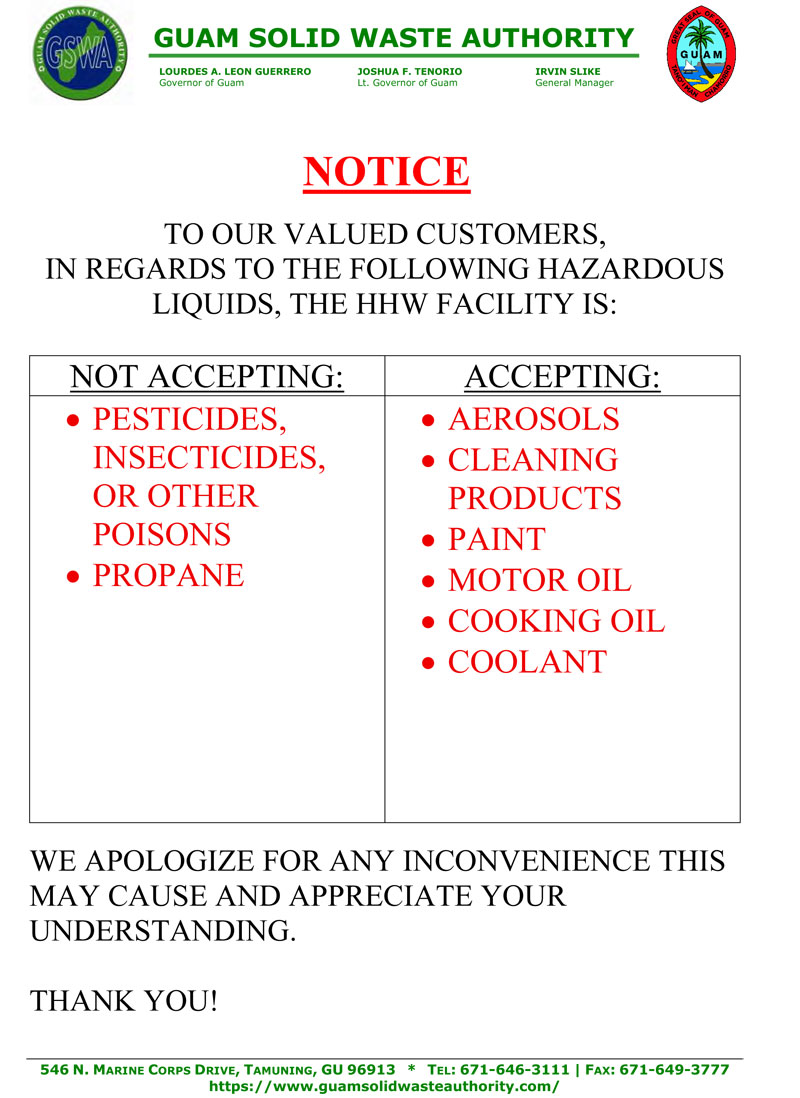The new Household Hazardous Waste (HHW) facility and Harmon Residential Transfer Station opened January 23, 2015. Both facilities are located on Harmon Industrial Park Road behind the Government of Guam’s Department of Public Works complex. (see images of the construction)

The HHW facility allows residential customers to dispose of their everyday toxic material. Customers are limited to 15 gallons or 100 pounds of household hazardous waste items per day.
The facility is open from 9 a.m. to 5 p.m. Thursday through Monday and closed on Tuesdays, Wednesdays, and all Government of Guam holidays.

HHW FACILITY LIST OF ACCEPTED ITEMS:
From The Garage
- Antifreeze
- Automobile oil
- Brake Fluid
- Contact cement
- Fluorescent light bulbs
- Joint compound
- Latex Paint
- Non-automotive oil
- Oil Filters
- Shellac
- Transmission fluid
From the Kitchen
- Thermometer
- Used cooking oil
From the Home & Garden
- Batteries, button
- Batteries, rechargeable
- Fertilizer (with pesticides) *solid only
- Light ballasts
- Mothballs
- Pesticides *solid only
- Rat poison
- Shoe polish *solid only
- Thermostats
- Weed killer *solid only
Electronics
- Televisions
- Monitors
- Radios
- Cell phones
- Pagers
- Computers
- Printers
- DVD players
- UPS systems
- Laptops
General Information
What is household hazardous waste?
Many products used in the home, garden, garage and hobby shop have hazardous characteristics such as poisonous, combustible, flammable or corrosive. When you decide to discard these products they become household hazardous wastes requiring proper disposal.
Why do I need to dispose of my household hazardous wastes differently from other trash?
Most people think of "hazardous wastes" as wastes generated by industry, but many household products contain the same chemicals found in industrial hazardous wastes. Improper disposal of household hazardous wastes, such as throwing them away with your household trash, dumping them in storm drains, or into sewer or septic systems, can endanger your health, the health of others and the environment.
There are many reasons it makes sense to collect hazardous household wastes separately and keep them out of landfills. Some wastes shouldn't be landfilled because they can be recycled or used as an energy saving fuel. Less household hazardous waste in the landfill means less hazardous leachate requiring expensive treatment. The risk of ground and water pollution if leachate leaks from landfills is also reduced. Garbage collectors and landfill workers can be injured by exploding aerosol cans, splashing chemicals or poisonous fumes created by mixed chemicals. Chemical reactions can also cause fires in garbage collection trucks.
Hazardous wastes should never be poured onto the ground or down storm drains. Products such as motor oil contain toxic chemicals and metals (hydrocarbons, lead, zinc, arsenic, chromium and cadmium) that will contaminate groundwater, drinking water and freshwater wildlife habitats. Other products may also have an adverse effect on water supplies and the environment.
Household hazardous wastes should never be flushed into septic systems or down sewer drains because these wastes can kill the active bacteria either in your septic tank or at the waste water treatment facility. Waste water treatment facilities cannot remove all heavy metals and these may contaminate sewage sludge, water supplies and animal habitats.
How do I know if a product is hazardous?
All hazardous products exhibit at least one of the following properties:
- Toxic
Even in small quantities may immediately poison, or cause injury or death through repeated exposure, when inhaled into the lungs, eaten, swallowed, or absorbed through the skin (e.g. rat poison, pesticides, bleach). - Flammable
Usually liquids that easily ignite and burn (e.g. lighter fluid, spot and paint removers). - Corrosive
Substances or vapors that can burn skin on contact and can eat away the surface of other materials (e.g. oven and toilet bowl cleaners). - Reactive
Substances that react with air, water or another substance to produce toxic vapors or explode (e.g. bleach when mixed with ammonia-based cleaners).
Check the label. Look for the following warning words: POISON, TOXIC, CORROSIVE, VOLATILE, FLAMMABLE, INFLAMMABLE, COMBUSTIBLE, EXPLOSIVE, DANGER, CAUTION, WARNING or HARMFUL. These words will alert you to the nature of the product.
What is the cost to drop-off household hazardous waste?
There is no charge to residents of the island of Guam. The expense for this facility is borne in the per ton tip fee of municipal solid waste.
Besides households can anyone else bring household hazardous waste to the HHW Facility?
The HHW facility is only permitted to receive material generated from households. The HHW facility cannot accept material from institutions, government, and commercial operations.
How much can I bring?
Residents can bring up to 15 gallons or 100 lbs. per visit per day.
Are free products available for reuse?
Household hazardous wastes are accepted from island residents for proper disposal or recycling. Many products are in usable condition and some have never been opened. Suitable products are made available to individuals, businesses, and government departments for reuse, free of charge, on a first-come, first-served basis. All persons accepting products will be asked to sign a liability and indemnification release.
Examples of products include: cleaners, automotive, fertilizers and other gardening products, grout and caulking, paints, stains & varnishes, wood sealants, etc.
Free products are available during facility open hours.
Safety
How can I use & store household hazardous products properly?
Follow the directions on the label. Ask the dealer or manufacturer to provide more explanation if needed. Don't use more of the product than is recommended. Never mix waste products; this can lead to explosions or poisonous gas being released. Use hazardous products in well-ventilated areas and always use gloves, eye protection and air purifying respirators whenever warranted. Never eat, drink or smoke where hazardous products are being used. Keep products in their original containers. If you do have to use a different container be sure to label adequately in case of poisoning and for safe use and disposal. Store all hazardous products upright, tightly sealed, and away from pets, children and food.
How can I transport household hazardous waste safely?
- Never mix different chemicals! Toxic fumes or an explosion can result and it prevents recycling of the materials.
- Leave waste products in their original containers, and make sure caps and/or lids are securely closed. Gasoline is highly flammable and should only be transported in purpose-designed gasoline cans or containers.
- Do not transport hazardous wastes in the same part of your vehicle as children or pets.
- If the original container is leaking or damaged, place the entire container in a larger container such as a clean paint can, plastic bucket, or wrap securely with plastic. If you wrap up a container so that the original label cannot be seen, mark the contents to the best of your ability, and be sure to tell the collection staff what the contents are.
- Separate different types of waste, such as paints, motor oil, batteries, pesticides, acids, etc.
- Place containers upright in sturdy cardboard boxes or plastic trays, and pad with newspaper. You may also want to line your car with plastic before you pack the car.
- Put containers in the trunk or rear of your car, not on passenger seats. Come straight to the Hazardous Materials Management Facility to avoid any problems with the waste.
- Don't eat, drink or smoke while handling household hazardous wastes. Wash your hands after handling these materials.
- Never put hazardous waste into trash bags or trash cans. Lids can come off causing chemicals to mix and possibly creating dangerous reactions.
- No containers (containing liquid) in excess of 15 gallons will be accepted.
What can I do to reduce my use of household hazardous products?
- Choose safer alternatives whenever possible.
- Choose water-based products over solvent-based or oil-based ones
- Avoid aerosols.
- Avoid products containing chlorinated compounds, petroleum distillates, phenols and formaldehyde.
- Avoid chemical air fresheners.
- Buy only what you need so you aren't left with hazardous waste.
- Give left over products to a responsible neighbor or friend who can use it up.
- Plant pest-resistant and disease-resistant species of plants. Reassess your tolerance of pests and if you must kill them, learn how to target them most effectively.


 PAY ONLINE
PAY ONLINE

